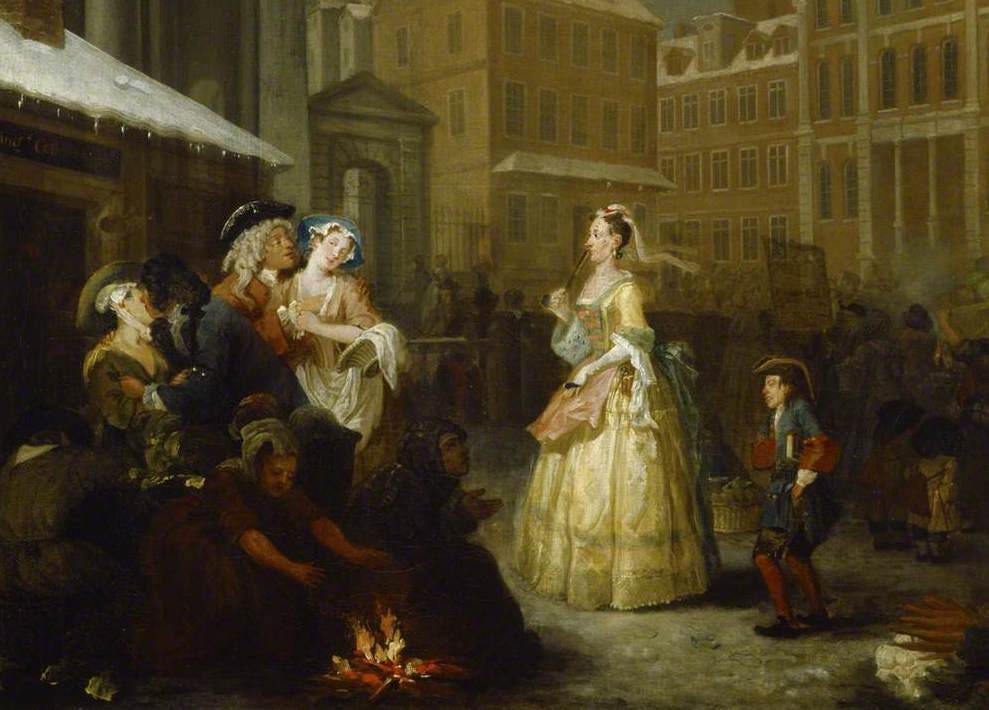Dear friends,
In the aftermath of the rape a surprising change in power has taken place. Clarissa has not fallen apart but risen in dignity and strength. Lovelace can no longer hide behind a pretence of care and respectability. He has shown Clarissa exactly who he his. She has moral superiority and intends to exercise it. “The methods taken with her have augmented her glory and her pride,” writes Lovelace, “She has now a tale to tell, that she may tell with honour to herself.”
“I am overmatched, egregiously overmatched by this lady,” he writes in letter 265. Two letters later and Lovelace is wishing he’d just gone ahead and married Clarissa when she first ran away with him — exactly as his friends and relations advised. Of course, Lovelace is only sorry now because things haven’t turned out as he expected. Clarissa has not conformed to any of his preconceived ideas about women. Once subdued, Clarissa has not remained subdued. His pride is hurt, “I am entangled in my own devices, and cannot bear that she should detect me.” More desperately, he has no idea how to win her back; by gentleness or terror. He oscillates between the two approaches, without ever giving a second thought to Clarissa’s own wishes. His narcissism and despair are summed up in these lines from letter 281:
“I tried by gentleness and love to soften — What? — Marble. A heart incapable either of love or gentleness. Her past injuries forever in her head. Ready to receive a favour, the permission to go to Hampstead; but neither to deserve it, nor return any. So my scheme of the gentle kind was soon given over.”
Lovelace insists that Clarissa’s pride is hurt as a result of the rape, but in every other way she has triumphed. It’s interesting that Richardson approaches ‘virtue’ ostensibly from a conceptual standpoint, addressing its meaning in the context of eighteenth century society. Any wrongdoing on the part of Lovelace would be wiped away by a swift marriage. Lovelace himself treats virtue as something for men to take (however nefariously) rather than for women to give away or to share. The emotional impact of the rape itself emerges between the lines — Clarissa has been “really ill” with a “violent stomach-ache.” But it is the emotional impact of rape, abuse and manipulation that we, as modern readers, feel in each and every line.
Marriage would certainly be the path of least resistance for Clarissa at this point; and the only way to reclaim her position in society. That she refuses outright to marry a man so villainous, so morally bankrupt, says a lot about her character. Belford, for one, is in awe of her decision: “How worthy of herself that it has made her hate the man she once loved!” Now willing to die for her honour, terror holds no sway for Clarissa. “Do not make me brutally threaten you!” says a desperate Lovelace in letter 277. Wounded from rejection, he decides to put Clarissa to a second trial, this time when she is fully in control of her senses. It goes badly wrong, largely because Clarissa smuggles a penknife and threatens to commit suicide in front of the entire house. “Now I am ten times worse off than before,” writes Lovelace, digging himself deeper and deeper, “I admire her more than ever!”
He is too late. In the best news of the week, Clarissa has once more escaped into London. Mowbray thinks it a fatal mistake, “A foolish little devill!” he writes, “Where will she mend herself? For nobody will look upon her.” We have to wonder if he’s right when Mrs Howe intercepts Clarissa’s letter to Anna and writes a damning reply: “The whole sex is indeed wounded by you.” Her opinion of Clarissa is the polar opposite of Lovelace, who sees Clarissa exalted by her response to his trials. In this way, if in no other, Lovelace talks sense. In letter 268 he exonerates Clarissa from all blame, believing that she did not choose to go to bed with him and therefore she should feel no shame for it. In doing so, he appears to challenge victim blaming. And yet, in letter 294 he asks if Clarissa had ideas of an honourable life: “what had she to do to let her fancy run a gadding after a rake? One whom she knew to be a rake?” It’s almost as if he cannot allow the blame to settle on his own shoulders for too long.
If you would like to follow our read-along please subscribe below, visit your Substack subscription settings and make sure Letters & Libations is checked. Please get in touch if you would like to be added to the Instagram chat group.
Featured image is ‘The Four Times of Day: Morning’ by William Hogarth (1697–1764). Courtesy of the National Trust, Upton House



